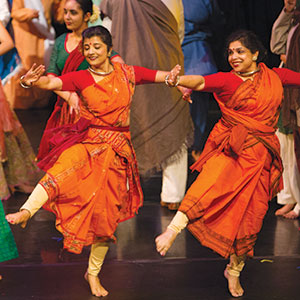

India and Pakistan were born from violence. Depicting that violence through the stories of its survivors posed a few obstacles for EnActe Arts, a local theatrical company whose next production, The Parting, comes to the Hammer Theatre this weekend.
“Showing graphic violence does not serve the purpose in any way,” says Vinita Belani, EnActe’s founder and artistic director, when describing her approach. “What we want to show is the idea of violence and the aftermath of violence, and so, because this is a dance-theater-in-equal-parts production, we use dance to stylize the violence. Then we show the actual horror of the violence through the after effects.”
In 1947, Britain partitioned its South Asian territory into the separate nation-states of India and Pakistan, bailing from the scene and unleashing what was likely, at that time, the biggest mass migration in human history. Anywhere between 10 and 15 million people were displaced and forced to leave their ancestral lands on a moment’s notice after being peaceful neighbors for millennia. Neighborhood after neighborhood disintegrated into civil war-style violence with Hindus, Sikhs and Muslims committing massacres against each other, while refugees spent weeks migrating between the two newly constructed countries. At least 1 million people lost their lives. Aside from exacerbating communal hatred and religious-based distrust in that part of the world, which politicians are still exploiting to this day, Partition is often mentioned in the same paragraph as the Holocaust or the bombings of Hiroshima and Nagasaki, yet it remains ignored in comparison to those other tragedies.
In telling the story, The Parting does not concern itself with the politicians and figureheads who oversaw Partition. Instead, the narrative relays the stories of people directly affected by the violence. Belani says she took this approach for a few different reasons. In the same way that the history of the Holocaust was not written by Hitler’s or Churchill’s views alone, but by what actually happened to the survivors, so should the story of Partition. Through narratives based on or inspired by real human events, the central narrative of the play asks questions. How did people experience Partition? What were their perceptions? How did they react to the cascade of events? Why was this allowed to happen?
“You cannot get an accurate historical context or view of any event until you tell it from the perspective of the people who survived that event,” Belani says, adding that even though politics brought us to the current point in history, the history was told by the people. “When you start researching those atrocities, and people committing atrocities on other people, who, until the day before, were neighbors and friends, you start to realize that this is a story about the people that were displaced.”
The Parting is a multidisciplinary, multiethnic experience, just like the sections of India that were affected. Kathak artist Farah Yasmeen Shaikh choreographed the dance elements, bringing in a variety of components including Mughal-style dancing, Hindu-derived temple dancing, Bengalis reading from Tagore, plus Punjabi music and a lone violinist wandering throughout. The violinist also composed of the original score, Raaginder Singh Momi. The goal was to convey perspectives from a variety of ethnicities, all of whom were devastated by the violence of Partition.
“I wanted a true representation of the people that were affected,” Shaikh says.
“Regardless of your vantage pointHindu, Muslim, Sikhyou can look at these stories and say, ‘Wait, that happened to my family too, yet I don’t fit the profile of that character.’ But that’s exactly it. The violence did happen to everybody, and there isn’t any one side to blame.”
However, one doesn’t need South Asian blood to feel empathy for survivors of genocidal-style massacres, religious-based hatred and the effects of Western powers carving up territories they don’t even understand. The production is universal in that sense. And above all else, since the horrors of Hiroshima and the Holocaust are well documented, so should be the effects of Partition.
The Parting
Fri-Sat, Mar. 23-24, 8pm
Hammer Theatre, San Jose
Tickets: http://enacte.org



